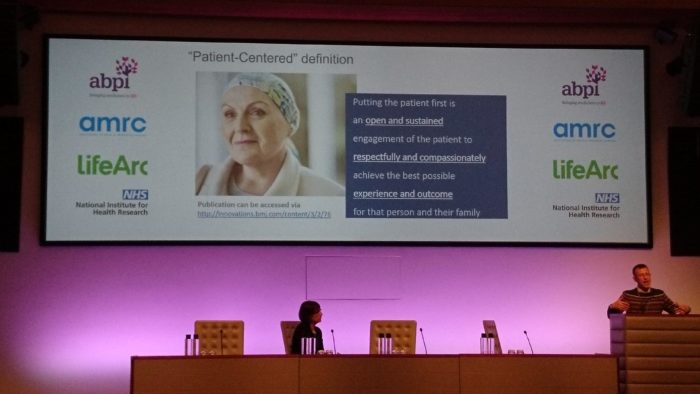Attending the Patients First: Pioneering Partnerships conference

By Barbara Hibbert, BCI UK Patient-Public Group member
On 20th March I was one of the representatives of the BCI UK Patient-Public Group (PPG) at the ‘Patients First: Pioneering Partnerships’ event put on by the Association of the British Pharmaceutical Industry (ABPI) and the Association of Medical Research Charities (AMRC).
I am a patient member of the PPG, with incurable and inoperable bowel cancer and am always interested in any initiative which encourages patients to find out more about, and become expert in, their condition or which allows them to take more control over their treatment pathway.
The event covered many conditions and we heard some powerful testimony from patients and carers. Michael Seres has had a long term chronic condition for over 35 years and has become a patient entrepreneur. He founded 11Health, a sensor solutions company for long term chronic disease patients attached to medical bags. They provide patented devices which are wireless, Bluetooth enabled and send secure real-time data to mobile devices such as smartphones, tablets, and watches. This data can then be shared with clinicians. Sarah Pullen’s son died of a brain tumour and since his death she has worked with the Brain Tumour Charity to raise funds for research and clinical trials and campaigned to raise awareness. She doesn’t want any future parents to be sent home without any idea where to turn for support.
My specific role was as a ‘table talk host’ together with Emily Boldison, BCI UK’s engagement facilitator. Our brief was to discuss Patient Leadership in BCI UK and the challenges that PPG members face. We explained who we are and what we do to a variety of representatives of other groups ranging from those focused on specific conditions, such as the Macular Society and the Brain Tumour Charity, to university researchers.
Hosting a ‘table talk’ was less challenging than I had feared but frustrating in that sessions went on concurrently and so I missed some presentations and seminars which sounded interesting and focused on public and patient involvement. For example, there was an interactive workshop on the new UK Patient and Public Involvement (PPI) Standards developed by the NIHR. These are designed to ensure quality and consistency in public involvement across the health research system.
We were well provided for with refreshments, and the breaks gave an opportunity to visit various stands, including one for the 100,000 Genomes Project, run by Genomics England, which I am going to investigate further as I am happy for my genome to be sequenced if it will help provide better diagnosis or treatment in the future.
Overall, it was a productive day and gave me an insight into the wider world of patient involvement and medical advances.
